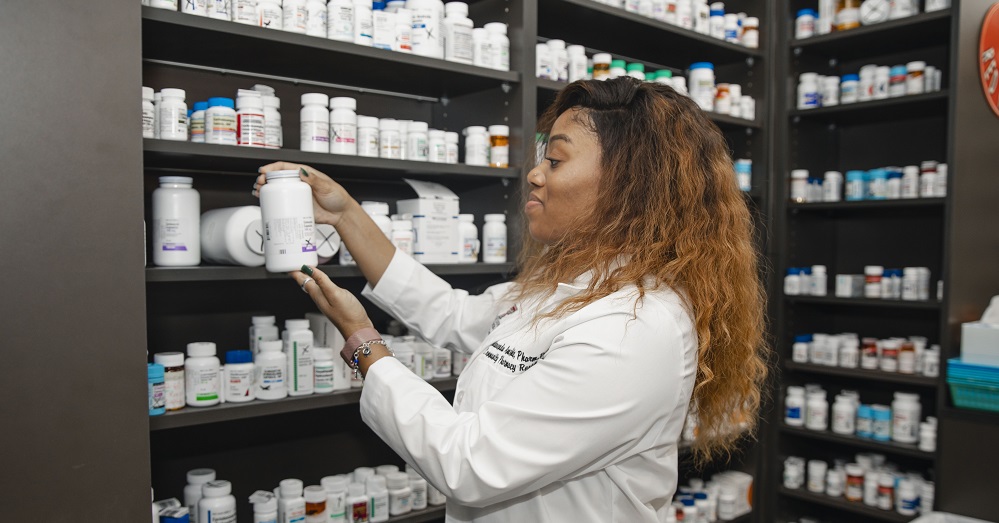High Temperatures Can Impact Patients Taking Medications

After a temperate start to the summer season, soaring temperatures have arrived in Texas. The Centers for Disease Control and Prevention (CDC) cites extreme heat as one of the most common and preventable weather-related causes of death in the United States, so people need to know the signs and symptoms of heat-related stress especially if someone is taking medication.
“There are certain medications that affect the ability of the body to cool off such as antidepressants, beta-blockers, thiazides or other drugs like decongestants that we may use for nasal congestion,” said Eric MacLaughlin, Pharm.D., chair of pharmacy practice at Texas Tech University Health Sciences Center (TTUHSC) Jerry H. Hodge School of Pharmacy. “Decongestants may work great for congestion; they cause constriction of blood vessels in the nose. They also do that in other areas of the body, so you might not be able to dissipate heat well.”
MacLaughlin said other medications such as antihistamines can cause what is called an anticholinergic effect, or a drying effect. These medications are for patients with a runny nose or watery runny eyes from allergies, but they can also dry a person out. There are a lot of medications that have anticholinergic effects.
“You don't want to be dehydrated or dried out in really hot sun,” he said.

MacLaughlin cautioned that patients should not stop taking medications during the heat of the summer.
“Continue taking your medication,” he said. “What I would really do is try to mitigate risk factors for heat-related illness. Go out in the early morning; don't go out in the middle of the day. Make sure you stay hydrated.”
MacLauglin said people should always keep sun protection top of mind.
“There are certain classes of medications that can actually cause you to burn easier,” he said. “Some of those same medicines like thiazide diuretics can cause photosensitivity and make you burn easier in the sun. Oral contraceptives can do that. Certain medications we use for acne called retinoids can cause easier burning in the sun.”
MacLaughlin reminded patients to consult a pharmacist if they have questions about the risk factors associated with medications and heat-related illness.
“Sometimes, there is a warning label on the prescription warning patients to avoid the sun or use some protection,” he said. “Most of the time it's in the very fine writing that you get every time you get a prescription in the patient leaflet. I would pay attention and read through those. Now, keep in mind, a lot of times they list every side effect under the sun, and certain ones are going to be more clinically applicable than others, but if there is something related to sun or heat exposure, especially in our high-risk patients, they are at greater risk, and many times, they're also on multiple medications.”
MacLaughlin added storing medication during the hot summer months takes extra consideration.
“I would definitely recommend not storing medication in the heat,” he said. “For instance, keeping medications in the car or a purse that is out in the sun is not a good idea as they could break down and not be effective. Some medications can also break down with light exposure. Medications should typically be stored at room temperature and away from heat or humidity; others require refrigeration.”

Rodney Young, M.D., professor and regional chair of the TTUHSC School of Medicine Department of Family Medicine at the Amarillo campus, recommended drinking plenty of water before, during and after going out in the heat. If you start to feel like you’re overheating, he suggested getting the skin wet and sitting in front of a fan. That will help with cooling the body down. Wear hats and loose-fitting, light-colored clothing that breathes well and wicks moisture away from the skin. Seek shade and take plenty of breaks to avoid overdoing it.
“When you are out in the sun, your body will try to eliminate excess heat through sweat, but you can also lose a good deal of moisture through breathing, especially if you are exercising and breathing harder,” Young said. “You lose small amounts of moisture normally with each breath, and those amounts can really add up in hot, dry and windy conditions. Staying hydrated before and during exposure is critical to helping stay ahead of those losses.”
Young said signs and symptoms of heat-related illness include sweating an unusually large amount or a surprisingly small amount when you would expect to sweat more, palpitations or a rapid heart rate, nausea, sometimes with abdominal pain, muscle cramps, malaise (unusual fatigue), confusion, poor concentration, lethargy, headache and irritability.
“When you're in a very humid environment, you sweat a lot,” Young said. “As a result, you will be unable to dissipate enough heat, so you really have to hydrate yourself. It helps to pay attention to subtle signs like soreness and feeling a little worn out and a little confused.”
In case of a heat-related emergency, call 911.
Related Stories
The John Wayne Cancer Foundation Surgical Oncology Fellowship Program at Texas Tech University Health Sciences Center Announced
TTUHSC is collaborating with the John Wayne Cancer Foundation and has established the Big Cure Endowment, which supports the university’s efforts to reduce cancer incidence and increase survivability of people in rural and underserved areas.
Making Mental Health a Priority in the New Year
Sarah Mallard Wakefield, M.D., a psychiatrist with Texas Tech Physicians, talks about strategies to combat widespread and growing anxiety.
TTUHSC Dean to be Inducted into the National Academies of Practice as Distinguished Fellow
Gerard E. Carrino, Ph.D., MPH, dean of the TTUHSC Julia Jones Matthews School of Population and Public Health, will be inducted into the National Academies of Practice (NAP) as a Distinguished Fellow of the Public Health Academy.
Recent Stories
National Academy of Inventors Names TTUHSC Faculty Senior Members
The National Academy of Inventors (NAI) has designated two current and one former TTUHSC faculty researchers as Senior Members.
The John Wayne Cancer Foundation Surgical Oncology Fellowship Program at Texas Tech University Health Sciences Center Announced
TTUHSC is collaborating with the John Wayne Cancer Foundation and has established the Big Cure Endowment, which supports the university’s efforts to reduce cancer incidence and increase survivability of people in rural and underserved areas.
TTUHSC Receives $1 Million Gift from Amarillo National Bank to Expand and Enhance Pediatric Care in the Panhandle
TTUHSC School of Medicine leaders accepted a $1 million philanthropic gift from Amarillo National Bank on Tuesday (Feb. 10), marking a transformational investment in pediatric care for the Texas Panhandle.
